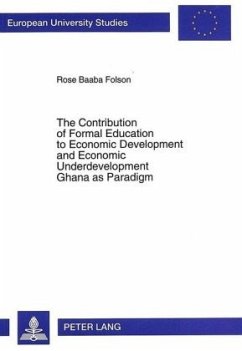A positive contribution of formal education to development has become widely accepted and rarely questioned. Schooling has been generally assumed as a producer of creativity and therefore a causal factor for economic and social change. Employers have regarded schooling as providing skills, preparing youth for economic functions in an increasing complex technological society, including socializing them to fit into new models of economic organisations, thus helping them into higher incomes and status - a step forward in a success-oriented economy. This study examines the correlation between the formal educational system and development in Ghana, and comes to the conclusion that the widespread hypothesis that expanding schooling in itself increases social welfare which results in national economic growth is still to be questioned.
